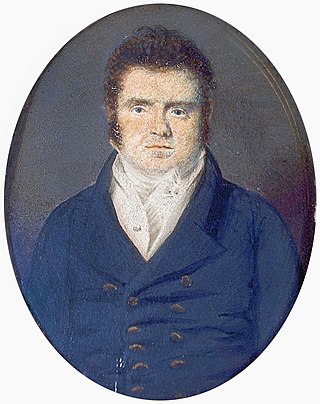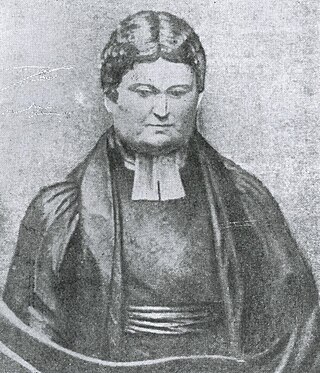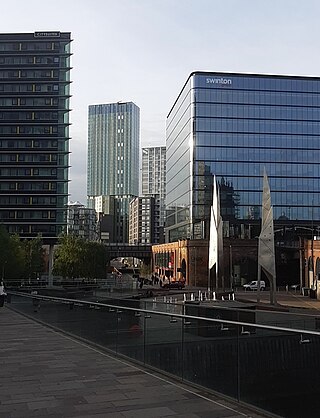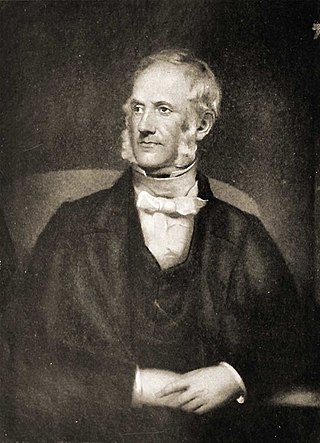
John Edward Taylor was an English business tycoon, editor, publisher and member of The Portico Library, who was the founder of the Manchester Guardian newspaper in 1821. It was renamed in 1959 The Guardian.

Weaste is an inner-city suburb of Salford, Greater Manchester, England. In 2014, Weaste and Seedley ward had a population of 12,616.

William Cowherd was an English Christian minister and vegetarianism activist. He served a congregation in Salford known as the Bible Christian Church. Cowherd advocated and encouraged members of his then small group of followers, known as Bible Christians or "Cowherdites", to abstain from the eating of meat as a form of temperance. The Church was one of the philosophical forerunners of the Vegetarian Society founded in 1847.

Peel Park is a public urban park in Salford, Greater Manchester, England, located on the flood plain of the River Irwell below Salford Crescent and adjacent to the University of Salford. It was the first of three public parks to be opened on 22 August 1846, for the people of Manchester and Salford, paid for by public subscription. The park was the main public venue for the 1851 royal visit of Queen Victoria to Manchester and Salford and has been the subject of a number of paintings by the Salford artist, L.S. Lowry.

Sir Thomas Potter was an English industrialist and Liberal politician, and the first Mayor of Manchester.

Greengate is an inner-city suburb of Salford in Greater Manchester, England. It is bounded by the River Irwell, Victoria Bridge Street and Chapel Street, Blackfriars Road and Trinity Way. Greengate is the original historic core of Salford and sits within the easternmost part of the City of Salford. Greengate is currently experiencing a period of intensive development activity and growth, benefiting from its location just across the River Irwell from the City of Manchester.

The Bible Christian Church was a Christian vegetarian sect founded by William Cowherd in Salford, Greater Manchester, in 1809, as a spilt from the Swedenborgians. Members of the church were committed vegetarians and the church was foundational in the formation of the British and American vegetarian movements.

Absalom Watkin (1787–1861), was an English social and political reformer, an anti corn law campaigner, and a member of Manchester's Little Circle that was key in passing the Reform Act 1832.
The Little Circle was a Manchester-based group of Non-conformist Liberals, mostly members of the Portico Library, who held a common agenda with regards to political and social reform. The first group met from 1815 onwards to campaign for expanded political representation and gain social reform in the United Kingdom. The second group operated from 1830 onwards and was key in creating the popular movement that resulted in the Reform Act 1832.

Richard Potter (1778–1842) was a radical non-conformist Liberal Party MP for Wigan, and a founding member of the Little Circle which was key in gaining the Reform Act 1832.

Weaste Cemetery, previously known as Salford Borough Cemetery, is a public Grade II listed Victorian cemetery in Weaste, Salford. Opened in 1857, it is the oldest of Salford's four cemeteries, covering 39 acres (16 ha) and containing over 332,000 graves. It was established due to the overcrowding of churchyards, officially opening on 1 September 1857, with its first interment being Joseph Brotherton on 14 January 1857. The cemetery, which was bombed during the 1940 Manchester Blitz, now features a heritage trail and guided tours, with several Grade II listed monuments. It also holds graves of 373 Commonwealth service personnel from both World Wars, with special memorials and listings for those buried abroad and in unmarked graves.

Vegetable Cookery: With an Introduction, Recommending Abstinence from Animal Food and Intoxicating Liquors is the first vegetarian cookbook, authored anonymously by Martha Brotherton of Salford.
Martha Harvey Brotherton was an English cookbook writer and an advocate for vegetarianism. In 1812, she published Vegetable Cookery, the first known vegetarian cookbook. She married Joseph Brotherton, her cousin, in 1806; he later became Salford's first Member of Parliament. A passionate supporter of the Bible Christian Church, she championed the church's values, which included dietary reform and ethical living.

James Simpson was a Bible Christian deacon and activist for a number of causes. He was active in the vegetarianism, temperance, anti-tobacco, anti-Corn Law and peace movements. Simpson co-founded and served as the first President of the Vegetarian Society.
James Scholefield, was an English religious leader, social reformer, undertaker, and medical practitioner. He is known for his contributions to the Bible Christian Church, his advocacy for vegetarianism and temperance, and his involvement in the British radical reform movement.

James Clark was an English Bible Christian Church minister and activist for temperance and vegetarianism. Clark was deeply involved in social causes, including relief efforts during the Cotton Famine and service on the Salford Board of Guardians. As honorary secretary of the Vegetarian Society, he represented the organisation at international congresses and helped found the International Vegetarian Union.

Peter Foxcroft was an English cotton mill manager, inventor, Bible Christian Church preacher, and vegetarianism activist. He was an early and prominent member of the Vegetarian Society and a leading figure in the Bible Christian Church. Foxcroft managed a cotton mill owned by Charles and John Tysoe, and filed several patents for improvements in cotton machinery.

William Harvey was an English industrialist, cotton mill owner, deacon, and activist. He was an advocate for parliamentary reform, temperance, vegetarianism and against tobacco. Harvey helped found the Bible Christian Church and served as deacon from 1809 till his death. He helped establish the Vegetarian Society, the Manchester and Salford Temperance Union, and the United Kingdom Alliance, serving as President of each organisation. Additionally, he served as Vice President of the Anti-Tobacco Society. Harvey also assisted in founding Salford City Council and served as one of Salford's first aldermen from 1844 to 1870. He was elected Mayor of Salford in 1857 and 1858.

James Gaskill was an English cotton spinner, Bible Christian minister, and activist. He was an advocate for temperance and vegetarianism.
Helen Brotherton, sometimes known as Ellen Brotherton, was an English vegetarianism activist and philanthropist. She was known for her dedication to charity and her contributions to the vegetarian movement. Brotherton was a member of the Vegetarian Society from its founding and served as vice president. She was the daughter of Joseph Brotherton, Salford's first Member of Parliament, and Martha Brotherton, the author of the first vegetarian cookbook, Vegetable Cookery.


















